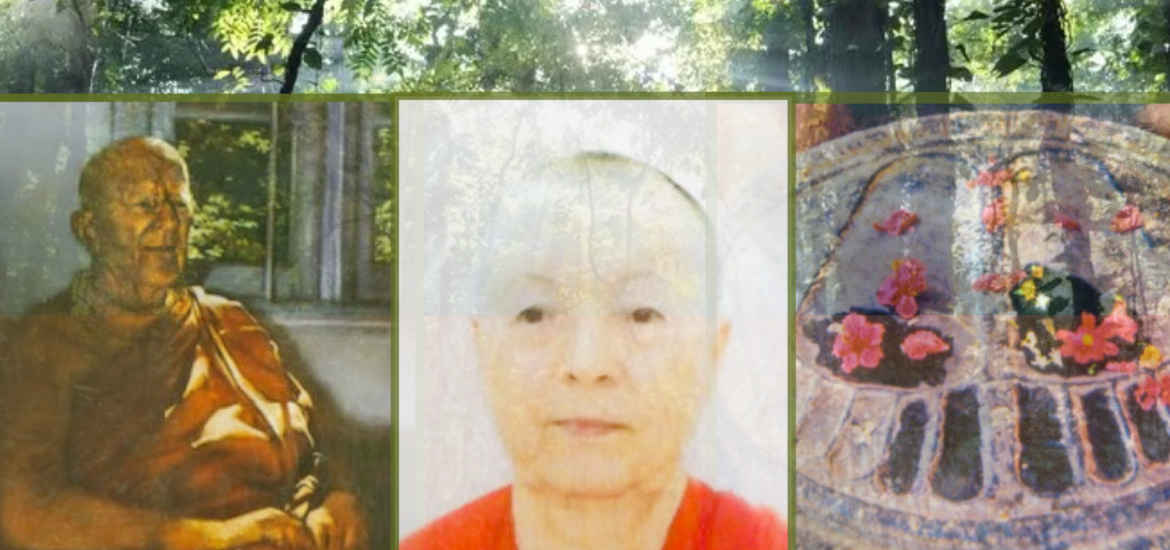With the coming of the new, there is always the passing of the old. Our entry into the new year this year comes with news of the death of the Venerable Ayyā Mie Vimalā (1943–2023) on 3 January, one of the last members of the old Western Theravāda monastic tradition of the Forest Hermitage and Island Hermitage in Sri Lanka. Ayyā Mie Vimalā was an extraordinary monastic, born in Königsberg, East Prussia (now Russia) in the midst of World War II to a Japanese father and a German mother. Königsberg is known as the hometown of the great Enlightenment philosopher Immanuel Kant. She had a distinct dual identity, literally possessing two names: Michiko Tokue and Margarete Kurbjeweit.
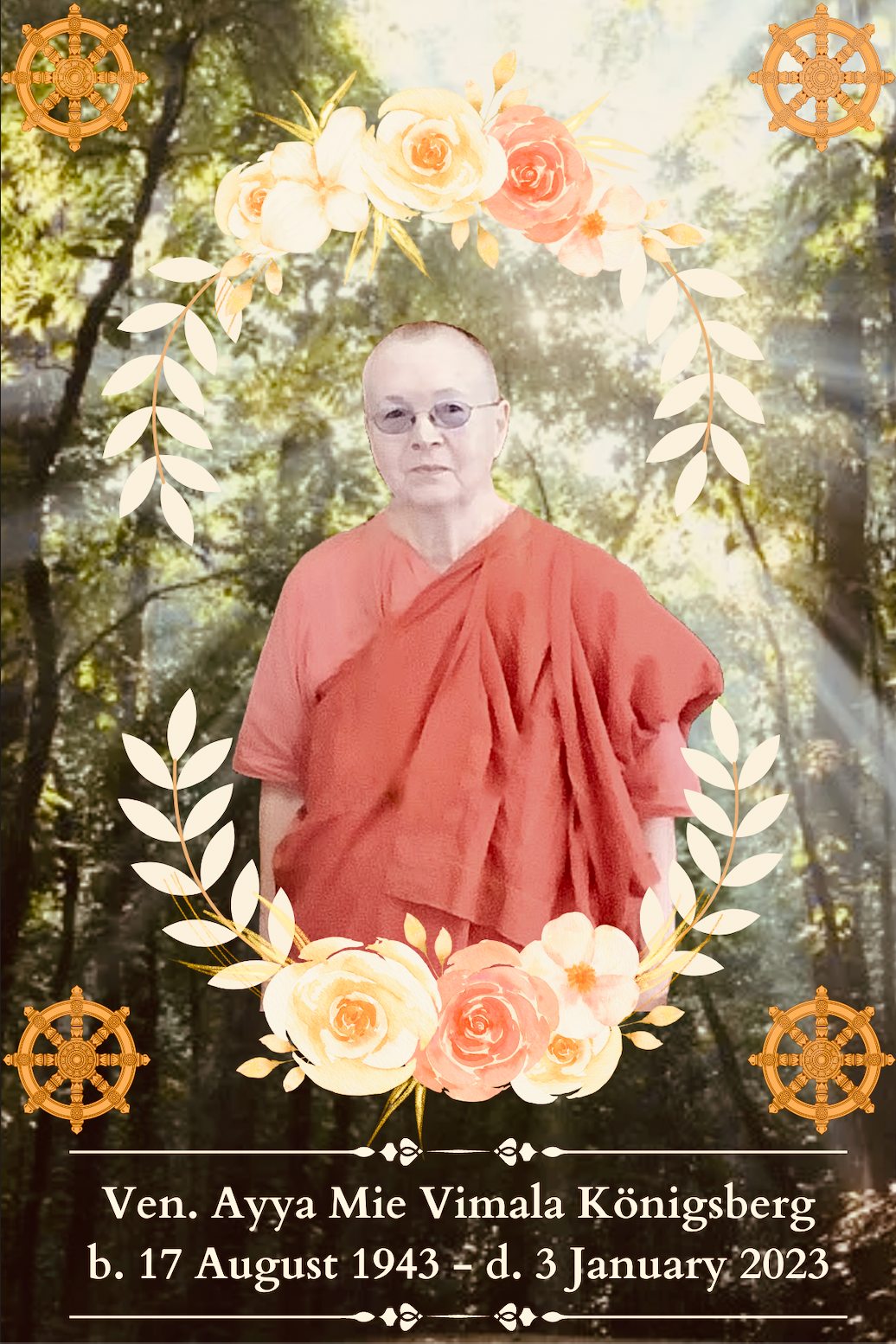
After the Germans were expelled from Könisberg with annexation of the USSR, and the food shortages and other sufferings of the early post-war years in Germany in her youth; in her adult lay life, she knew the things of the world—she had a career as an opera singer and was married with a son, before divorcing. In his obituary dedicated to her, Ven. Bhikkhu Bodhi, her Dhamma brother and friend of many decades from their time with the legendary German bhikkhu Ven. Nyanaponika Thera at the Forest Hermitage (more on that below), writes:
“[S]he was trained in music and had a professional career as an opera singer. This gave her great happiness, but not complete satisfaction. Despite her professional success, she always felt that something was missing. In her 30s she developed an interest in Buddhism, which she first pursued through the practice of Zen meditation, perhaps because it corresponded most closely with her Japanese heritage.”
She would become a Buddhist in 1968, taking Refuges and Precepts in the Soto Zen tradition with the Japanese Buddhist name Mie. It is a Japanese Buddhist tradition that those committed, legally add their precepts name to their identity cards and keep it for life: thus her passport name of ‘Mie Margaret Kurbjeweit.’
“Soon after her fortieth birthday, her life underwent a dramatic change. She had read an article about Sri Lanka in a German cultural magazine. The article featured Ven. Nyanaponika and included a photograph of him sitting at his desk in the Forest Hermitage, in the Udawattakele Forest Reserve near the town of Kandy. The article – and especially the photograph of the Mahathera – made a strong impact on her, and she was determined to meet him. Ven. Nyanaponika had lived in Sri Lanka since 1936 and was widely regarded as one of the world’s foremost authorities on Theravada Buddhism. Since he was from her home country and had even lived in Königsberg himself for a time during his youth, she felt a special affinity with him.
“She joined a tour group from Germany visiting Sri Lanka during the Christmas holidays of 1983. One day, on a trip to southwest Sri Lanka, she had an irresistible impulse to meet the German elder, and so she left the tour group and set out for the town of Kandy. When she finally arrived at the Forest Hermitage, she felt she had finally come home. She immediately recognized Ven. Nyanaponika as her teacher and asked him to accept her as his student. Over the next few years, she returned to Sri Lanka several times to spend time with Ven. Nyanaponika and to immerse herself more deeply in Sri Lanka’s ancient Buddhist heritage.”
In 1984 she would further take on the Pāli Buddhist name Vimalā requesting the traditional Buddhist five precepts with brahmacariya (celibacy), and in 1991 she undertook anāgārikā (“left-home”) precepts at the Forest Hermitage in Kandy, Sri Lanka, with Ven. Nyanaponika Thera in 1991, who she had instantly recognized as her teacher—it was he who gave her Pāli name. With her teacher’s blessings, in 1992 she requested and received 10-precept ordination as a sāmanerī at the Thumpane Temple, Malwatta Mahavihara in Kandy, with Ven. Piyadassi Thero as preceptor, becoming one of the small handful of devout western women afforded that opportunity in Sri Lanka, India, and America, before the Theravāda bhikkhunī revival returned to Sri Lanka in the late 90s. Per the Sri Lankan monastic traditions, her name then became Ven. Königsberg M. Vimalā, with her monastic Pāli name following the locative name of her natal village.
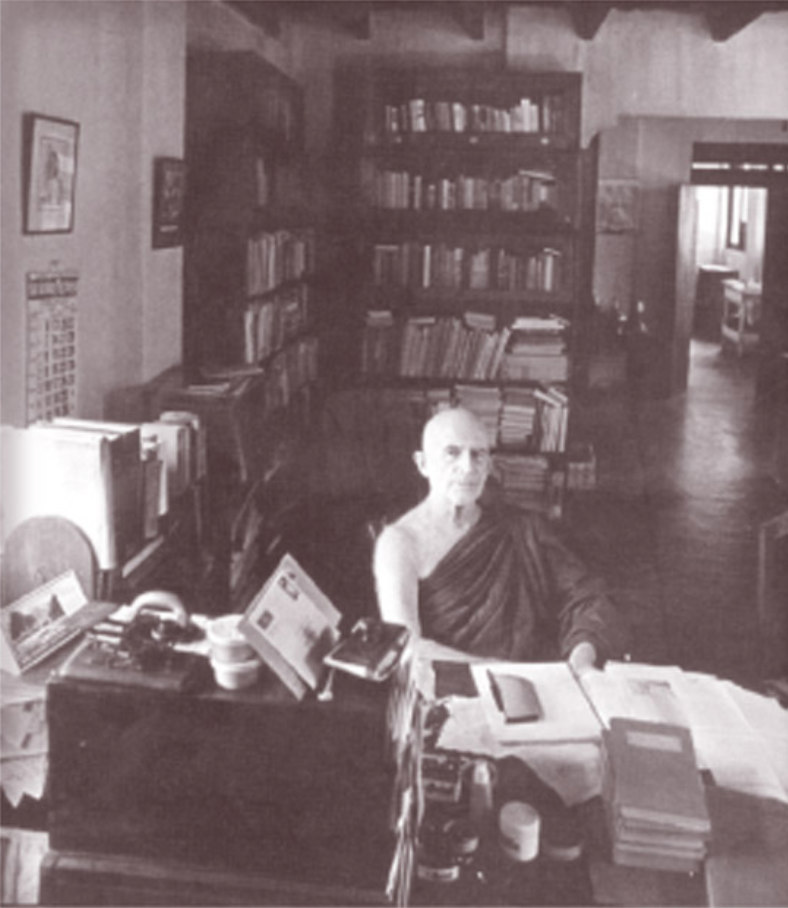
In the footsteps of the giants Ven. Nyanatiloka Thera, and her teacher Ven. Nyanaponika Thera, Ven. Ayya Mie Vimalā of Königsberg was one of the last of a unique lineage of German monastics in the Sri Lankan Theravāda tradition, which also included the late, great teacher Ven. Ayyā Khemā (1923–97), and the hermit Ayyā Dhammā Mahātherī.
Ayyā Dhammā, who with Ayyā Khemā fully ordained as a bhikkhunī in 1988, still lives at the Dhamma-Stiftung Kloster Hassel “monastery eco-village” she founded in the medieval village of Hassel in the idyllic mountain slopes, meadows and forests of Rhineland, Germany. However, with the changing of the generation, the old Western lineage at the Forest Hermitage in the Udawattekele Reserve in Kandy, and the Island Hermitage of Polgasduwa Aranya and Parappuduwa Nuns Island in Galle District has now come to an end.
While there are still Theravāda bhikkhus at the Forest Hermitage and the Island Hermitage, they are now continued with Sri Lankan forest monks not connected to the old Nyantiloka-Nyanaponika-Nyanamoli lineages. Here it may be noted that one of Ayyā Mie Vimalā’s earliest publications was commemorative of her teacher: Nyanaponika Mahathero Kalyanamitta. In the early years of the twenty-first century, she was active in Sri Lanka with the BPS Buddhist Publication Society founded by Ven. Nyanaponika, now led by retired Prof. P. D. Premasiri, Ayyā Mie Vimalā’s own Pāli teacher, who authored the forward for most of her books. Ayyā was in the final stages of editing a forthcoming book: German Scholars in Pali Buddhism and Sanskrit Indology, when she died.
Ayyā Mie Vimalā’s Dhamma publications over the years also notably included two books on Death Contemplation (Marananusati): Crossing the Realm of Death: Contemplation of Death in Buddhist Meditation, Literature, and Living Experience (2008) and Marananussati: Contemplation on Death in Buddhist Literature (2018). During her second visit to Hawaii, she participated in a six-week long lecture series on “Living and Dying In Buddhist Cultures” organized by Ven. Karma Lekshe Tsomo at the University of Hawaii Mānoa in Honolulu. This was life changing for her, inspiring her later investigations, publications and teachings on this topic, in both Buddhist traditions and other world traditions. While Ayyā Mie Vimalā’s death on 3 January in Kandy was felt as sudden and unexpected to all her knew her, she herself must not have been mentally and spiritually unprepared.
Returning to Ayyā Mie Vimalā’s life story, in memoriam; her years in Sri Lanka and time in Germany, alternated with years as a teacher and Buddhist leader active with both Theravāda Buddhist and Japanese Shin Buddhist as well as Chinese bhikkhunīs’ communities in Hawaii. It was in her years in Honolulu, teaching and participating with these diverse Buddhist communities, that she learned of and developed a deep and abiding interest in the late great founding patron of Hawai’ian Buddhism, Mary Mikahala Foster (1844-1930). Hawaiian native philanthropist Mary Foster is famously known as the “foster mother” of— and perhaps most important supporter of—Anagarika Dharmapala, donating what would now be millions of US dollars towards the Dharmapala’s efforts for the restoration of the ancient Buddhist heritage sites of India, as well as to the survival and development of Theravada Buddhism in Sri Lanka during colonial times.
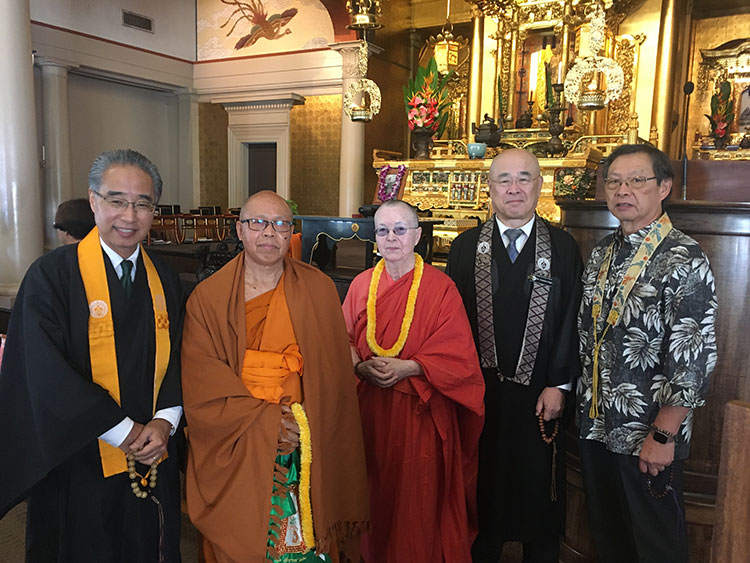
Ven. Ayyā Mie Vimalā founded not only the Theravāda Vihāra of Hawaii, but also Maha Bodhi Hawaii; she was a lifetime member of the Maha Bodhi Society of Sri Lanka with strong connection to the Maha Bodhi Society of India and Anagarika Dharmapala Trust. Researching Mary Foster and Anagarika Dharmapala’s lives in Hawaii, India and Sri Lanka, Ayya Mie Vimalā authored and published the book, Mary Mikahala Foster The Noble Hawaiian Lady and Anagarika Dharmapala, and established yearly memorials for Mary Mikahala Foster in Hawaii, in recognition of the enormous debt of gratitude Sri Lankan Buddhists, and all who could travel to the Buddhist heritage sites of India—as well as the Buddhists of Hawaii—had to this noble Hawaiian lady, Hawaii’s first Buddhist. Ven. P. Seewalee Thero, General Secretary of the Maha Bodhi Society of India remembers:
“Ayyā Vimalā was deeply moved by the contribution of Lady Foster towards the cause of Buddhism, from a distant land. Anagarika Dharmapala considered Mary Foster as his foster Mother, they had a very strong spiritual bond since their very first meeting at Hawaii until their end. The Bodhi Sapling brought to Hawaii by Anagarika Dharmapala from Srilanka was planted by Mary Foster. Ayyā Vimalā paid her gratitude to this noble Hawaiian Lady for her great support towards the revival of Buddhism at the time. She asked me for a few photographs from the Dhammapala Museum at Sarnath to be included in her book. I have met her at Malwatta Temple in Kandy and had a good discussion on various topics on Dhamma. She wished to visit Maha Bodhi Society of India, Kolkata and Sarnath to learn more detail about Mary Foster and Anagarika Dharmapala.”
Now in her late 70s, after years in Hawaii, Ven. Ayyā Mie Vimalā felt called to return to her spiritual home, the Island of Sri Lanka, for the final years of her life. There were delays due to the COVID pandemic, but after a stop in Germany where there was interest in translating her books with the German Verlag Beyerlein press, 2022 found her back on the island of her ordination and her Buddhist tradition, working on finalizing her last book, German Scholars in Pali Buddhism and Sanskrit Indology with her American friends Ken and Visakha Kawasaki, the founders of the Buddhist Relief Mission in Sri Lanka.
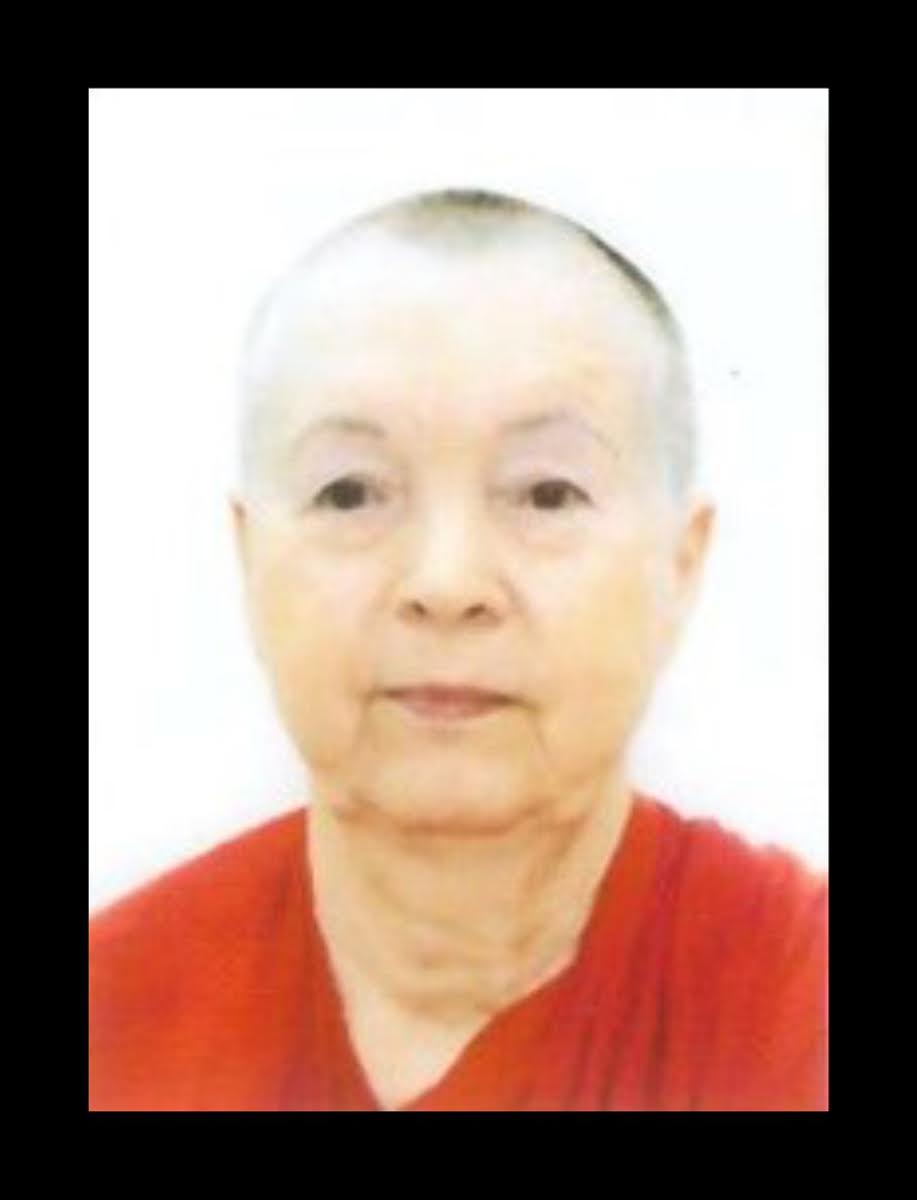
It was in the final weeks of 2022 that she came to know of her advanced cancer. Noting the deterioration of her condition at the end of December, she returned from Colombo to Kandy, to “the feet” of the Udawattakele Forest Reserve, and the Forest Hermitage of her great teacher Ven. Nyanaponikā, where she breathed her last. Ven. Bhikkhu Bodhi relates in his obituary:
[Ayyā Mie Vimalā] wrote back to me on December 30th, 2022, telling me that she arrived in Kandy… In my earlier email, I had quoted the Buddha’s advice to Nakulapita: “Even if my body is ill, my mind shall not be ill.” In her response she said: “Since a very long time, I have had the realization, ‘This body is not mine.’” She ended this message by wishing me a Happy New Year.
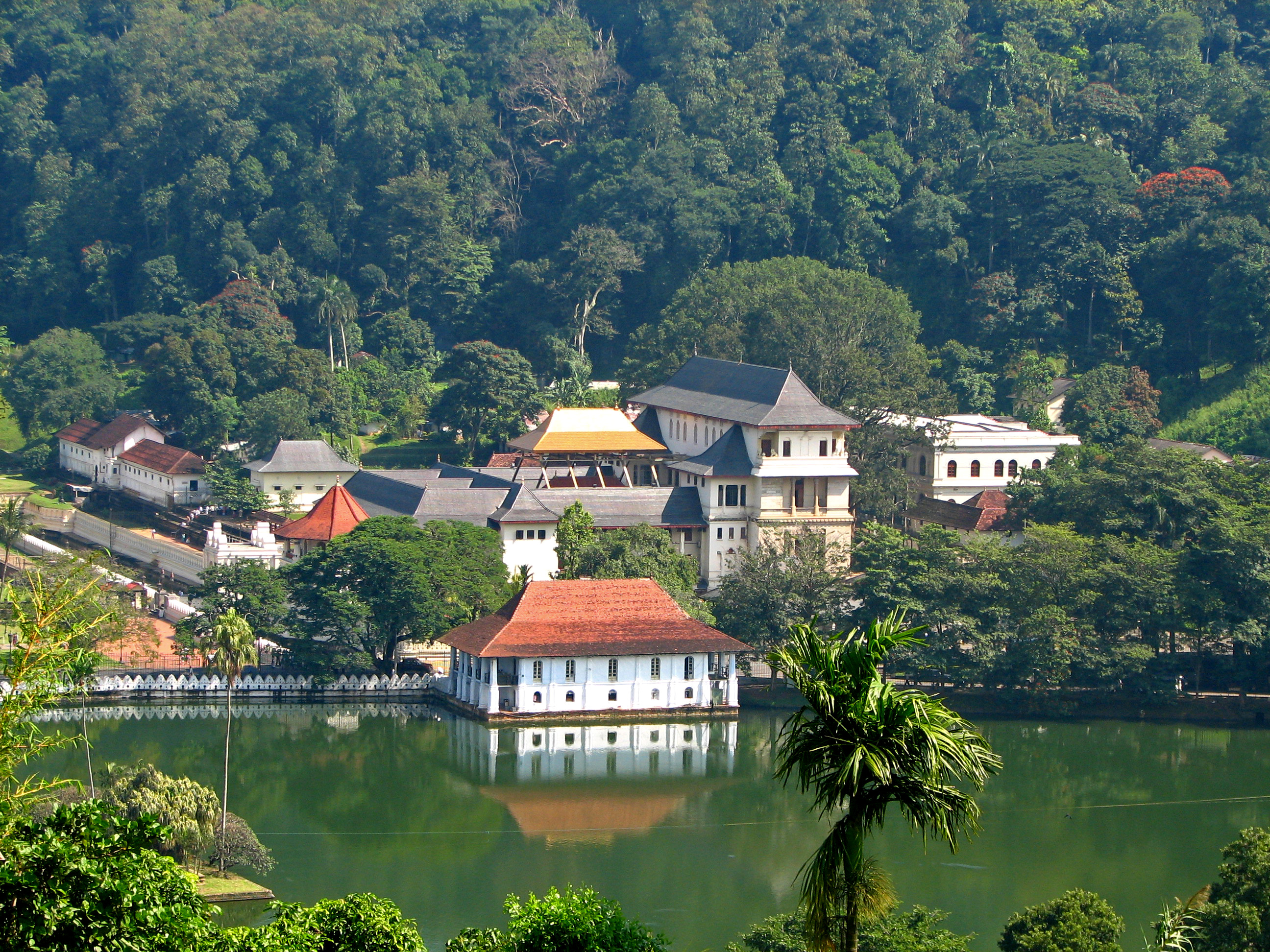
No stranger to the Early Buddhist teachings and practices related to death and dying, Venerable Ayyā Mie Vimalā of Königsberg passed away just a few months short of her 80th birthday, the age of the Buddha himself when he died. By all who knew her, she is remembered not only as a faithful monastic of the Theravāda tradition, a dedicated practitioner and Buddhist teacher, but perhaps first and foremost, as “a good friend.” The passing of a generation.
“Aniccā vata saṅkhārā
uppādavayadhammino;
Uppajjitvā nirujjhanti;
tesaṁ vūpasamo sukho’ti.
“Oh! Conditions are impermanent
their nature is to rise and fall;
having arisen, they cease;
their stilling is true bliss.”
— Mahāparinibbāna Sutta DN 16 (SuttaCentral)
May the late Ven. Ayyā Mie Vimalā of Königsberg attain the highest bliss and happiness of Nibbāna.*
Buddhist memorials have been held for her in Germany and in Sri Lanka, and are planned in Hawaii, as of this writing.
See more
Marananusati: Contemplations of Death and Dying in Buddhist Literature, Meditation, and Lived Experience (Ven. Ayyā M. Vimalā Konigsberg
(Vijitha Yapa, Sri Lanka))
Mary Elizabeth Mikahala Robinson Foster Remembrance Service Message (Hongwanji Hawaii)
BDG Features on the Teachings of Ven. Nyanaponika Thera
Nyanaponika Thera: Buddhist Monk and British Prisoner of War
How I Became a Theravada Buddhist
Baby Steps on the Path of Purity
On the Practice of Right Mindfulness
BDG News on Aragarika Dharmapala
India Releases Postage Stamp of Anagarika Dharmapala
Teachings of Anagarika Dharmapala Remain Relevant, Says Sri Lanka President
BDG Features on Death and Dying
* Material for this article came from the 11 January 2023 “Obituary for Ven. Ayyā Mie Vimalā” by Ven. Bhikkhu Bodhi, the draft “About the Author” from Ayyā Mie Vimalā’s book in preparation German Scholars in Pali Buddhism and Sanskrit Indology, and the introduction to her first book on Crossing the Realm of Death: Contemplation of Death in Buddhist Meditation, Literature and Living Experience, in consultation with past Buddhistdoor Global author, Ven. Ayyā Tathālokā Therī of Dhammadharini, Northern California.


